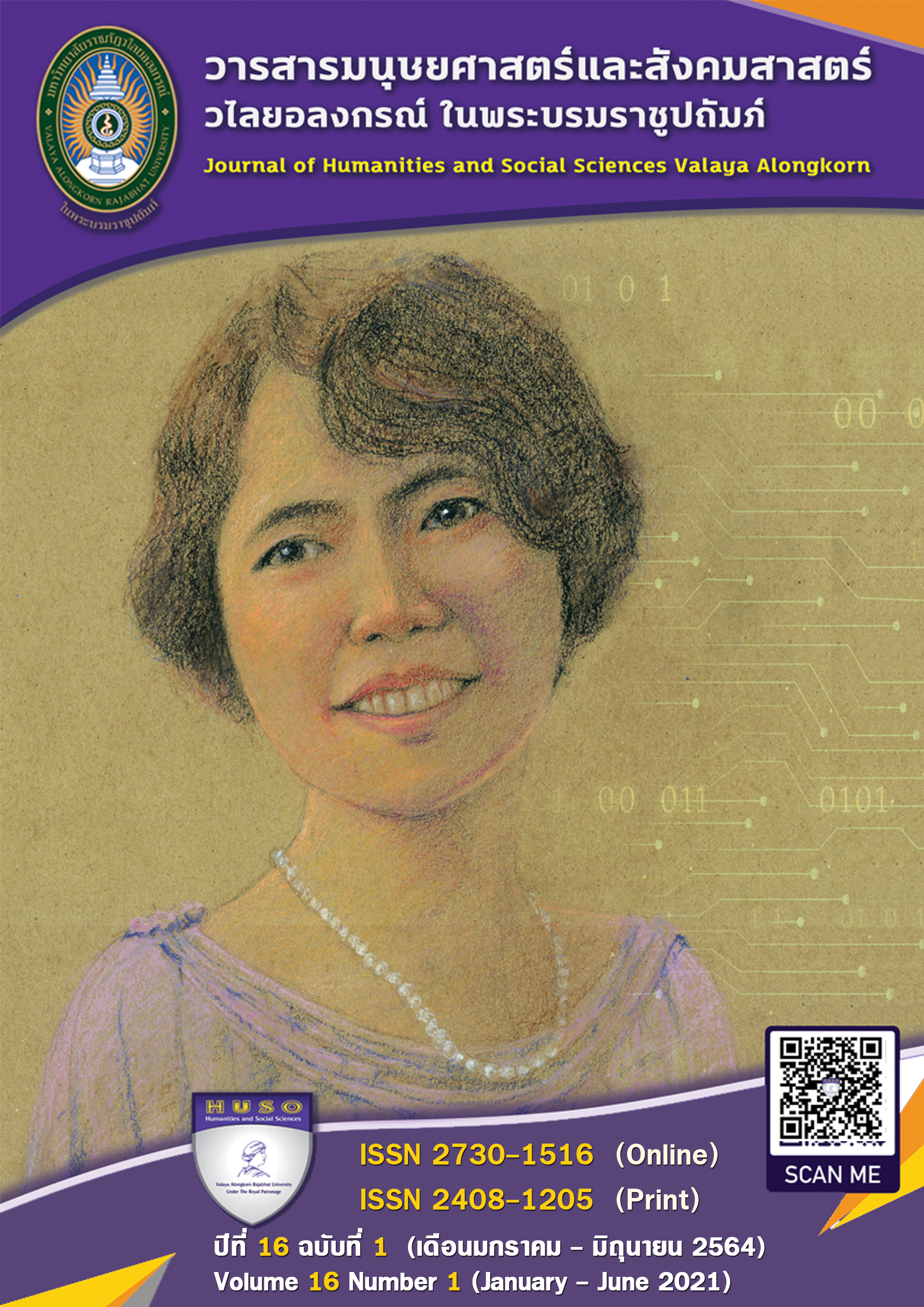USING THE SCIENCETIFIC MODELS TO PROMOTE ANALYTICAL THINKING ABILITY AND LEARNING ACHIEVEMENT OF THE SOLAR SYSTEM OF GRADE 9TH STUDENTS
Main Article Content
Abstract
This study aimed to compare students’ learning achievement on the solar system change after learning by using the scientific models with criteria of 80% and to explore their development of an analytical thinking ability after learning by using these models. The sample selected by using cluster random sampling was forty-nine, grade 9 students at the secondary public school in Bangkok, where the researcher was working as an in-service teacher in the 2nd semester in the academic year 2019. The research instruments consist of learning plans, the learning achievement test, and the analytical thinking ability test. The reliability of the achievement test was .81, and the analytical thinking ability test was .84. A total score of each student, mean score, standard deviations, percentages, and the analytical thinking ability’s gain scores were employed to analyze data. Results of this study revealed that by the end of the using the scientific models, Most students (91.83%) had learning achievement scores at an average of 25.36 3.27 with higher than the specified criteria of 80 percent, and they indicated a high-level of analytical thinking ability’s gain scores (78.70 percent).
Article Details

This work is licensed under a Creative Commons Attribution-NonCommercial-NoDerivatives 4.0 International License.
ลิขสิทธิ์บทความวิจัยที่ได้รับการตีพิมพ์เผยแพร่ในวารสารมนุษยศาสตร์และสังคมศาสตร์ วไลยอลงกรณ์ ในพระบรมราชูปถัมภ์ ถือเป็นกรรมสิทธิ์ของคณะมนุษยศาสตร์และสังคมศาสตร์ มหาวิทยาลัยราชภัฏวไลยอลงกรณ์ ในพระบรมราชูปถัมภ์ ห้ามนำข้อความทั้งหมดหรือบางส่วนไปพิมพ์ซ้ำ เว้นแต่จะได้รับอนุญาตจากมหาวิทยาลัยเป็นลายลักษณ์อักษร
ความรับผิดชอบ เนื้อหาต้นฉบับที่ปรากฏในวารสารมนุษยศาสตร์และสังคมศาสตร์ วไลยอลงกรณ์ ในพระบรมราชูปถัมภ์ เป็นความรับผิดชอบของผู้นิพนธ์บทความหรือผู้เขียนเอง ทั้งนี้ไม่รวมความผิดพลาดอันเกิดจากเทคนิคการพิมพ์
References
Bongkotphet, T. (2009). From Research to Effective Astronomy Teaching at Primary Education Level. Journal of Education Naresuan University. 13(3), 197 – 212. [in Thai]
Faikhamta, C. & Supatchaiyawong, P. (2014). Model-Based Learning. 29(3), 86 – 99.
Gilbert, J.K., & Boulter, C.J. (2000). Developing models in science education. New York: Kluwer Academic Publishers.
Harrison, A. G., & Treagust, D. F. (2000). A typology of school science models. International Journal of Science Education, 22(9), 1011-1026.
Jumnongsuk, L., Baowthongkm, N. & Phanprayoon, O. (2019). Effect of Active Learning for science concepts about the solar system of grade 9th Students. The Golden Teak: Humanity and Social Science Journal (GTHJ.). 25(3), 102-113. [in Thai]
Kanjanawasee, S. (2013). Classical Test Theory (7th Ed.). Bangkok, Chulalongkorn Publication. [in Thai]
Marzano, R.J. & Kendall, J. S. (2007). The New Taxonomy of Educational Objectives (2nd Ed.). Thousand Oaks: Corwin Press, SAGE Publication.
Mekiyanon, A., Singlop, S., Chauvatcharin, N. & Mekiyanon, M. (2019). Effect of The Inquiry Cycle (5Es) Learning Method with The Cooperative Learning: Group Investigation (GI) of The Solar System on Learning Achievement and Group Work Behavior for 4th Grade Students. Academic Journal of Mahamakut Buddhist University Isan Campus (Saeng Isan). 16(2), 84-100. [in Thai]
Office of the Basic Education Commission. (2017). Science learning standards and indicators revised version B.E.2560 (2017), Basic Education Core Curriculum B.E. 2551 (2008). Bangkok: The Agricultural Cooperative Federation of Thailand. Limited. [in Thai]
Orlich, D. C., Harder, R. J., Callahan, R. C., Trevisan, M. S., and Brown, A. H. (2010). Teaching Strategies: A Guide to Effective Instruction. Boston, MA: Wadsworth.
Penthong, S. (2012). Multi-experience of an Applying Digital Media for Education. IT SWU Symposium. Retrieved May 3, 2020, from http://it.cc.swu.ac.th/Portals/126/document/session5_multiexperience_Educ.pdf. [in Thai]
Saenprasit, K., Ardkaew, J., & Srijumnong, J. (2017). The development a causal model of factors influencing the analytical thinking abilities of the Prathomsuksa 6 students of schools under Loei Primary Educational Service Area Office 1: Multiple group analysis. Journal of Education Naresuan University, 19(2), 167-175. [in Thai]
The institute for the Promotion of Teaching Science and Technology. (2018). The results of the 2015 Trends in International Mathematics and Science Study (TIMSS). Bangkok, The institute for the Promotion of Teaching Science and Technology. pp.94. [in Thai]


